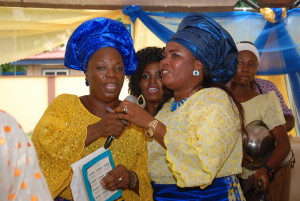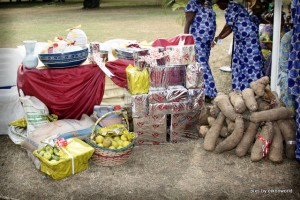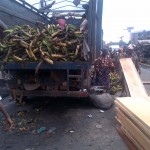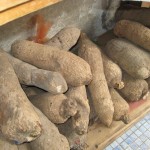A ṣe àkíyèsí pé wọn ti sọ iṣẹ́ ìyàwó-ilé di òwò nibi ìgbéyàwó ìbíl̀̀̀̀̀̀ẹ̀, pàtàki ni àwọn ilú nlá, nítorí èyí “ó ju alaga méjì tó ngbe inú ọkọ̀ bẹ ẹ. Wọn pè ìkan ni “Alaga Ìdúró” wọn pe ìkejì ni “Alaga Ijoko”. Gẹgẹbi àṣà ilẹ Yorùbá, kòsí bí “Ìyàwó ilé ti lè jẹ “Alaga” lórí ẹbí ọkọ tàbí ẹbí ìyàwó ti a ngbe. Ọkunrin ti o ti ṣe ìyàwó ti o yọri fún ọpọlọpọ ọdún, ti o si gbayí láwùjọ, yálà ni ìdílé ìyàwó tàbí ìdílé ọkọ ni a nfi si ipò “ALAGA” tàbí “OLÓRÍ ÀPÈJỌ.
Ìyàwó àgbà ni ìdílé ọkọ àti ti ìyàwó ni o ma nṣe aṣájú fún áwọn ìyàwó ilé yoku lati gbé tàbí gba igbá ìyàwó ni ibi ìgbéyàwó ìbílẹ. Ni ayé òde oni, a ṣe àkíyèsí wipé, ìdílé ìyàwó àti ọkọ, a san owó rẹpẹtẹ lati gba àwọn ti o yẹ ki a pè ni “Adarí Ètò Ijoko” fún ẹbi Ìyàwó àti “Adarí Ètò Ìdúró” fún ẹbi Ọkọ-ìyàwó”. Lẹhin ti àwọn obìnrin àjòjì yi ti gba owó iṣẹ́, wọn a sọ ara wọn di “Ọ̀GÁ”, wọn a ma pàṣe, wọn a ma ṣe bí ó ti wù wọn lati tún rí owó gbà lọ́wọ́ àwọn ẹbí mejeeji. Nípa ìwà yí, wọn a ma fi àkókò ṣòfò. Yorùbá ni “Alágbàtà tó nsọ ọjà di ọ̀wọ́n”.
“Ṣe bí wọn ti nṣe, ki o ba le ri bi o ṣe nri”, o yẹ ki á ti ọẃọ àṣàkasà yi bọlẹ̀. Ko ba àṣà mu lati sọ “Aṣojú awọn ìyàwó-Ilé” di “ALAGA”. Ipò méjèjì yàtọ sira, ó dẹ yẹ ki o dúró bẹ ẹ nítorí ọ̀gá méjì kò lè gbé inú ọkọ̀ kan.
ENGLISH TRANSLATION
It can easily be observed that Traditional marriages have turned largely commercial in nature and as a result of this there are more than two captains in such a ship. One is called “SEATING IN CHAIRMAN” while the second is called “STANDING IN CHAIRMAN”. In Yoruba culture, “a Housewife” cannot be made the CHAIRMAN over her husband’s family in either the Bride or the Groom’s Family. The Chairman in the Traditional Marriage is often an honourable man with many years of married life, carefully chosen from either the Bride or Groom’s family. Continue reading
Originally posted 2015-02-24 23:25:22. Republished by Blog Post Promoter









